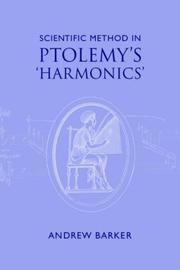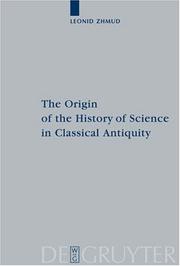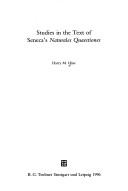| Listing 1 - 10 of 34 | << page >> |
Sort by
|
Book
ISBN: 1443838411 9781443838412 9781443837750 144383775X 9781299645295 1299645291 Year: 2012 Publisher: Newcastle-upon-Tyne : Cambridge Scholars Press,
Abstract | Keywords | Export | Availability | Bookmark
 Loading...
Loading...Choose an application
- Reference Manager
- EndNote
- RefWorks (Direct export to RefWorks)
Greek traditions relating to both the arts and sciences of life and health and those regarding the systematic development of theories of measurement and quantification enjoyed an incredibly long reputation and showed a kind of versatility that challenges any simplistic, dogmatic or a priori viewpoint about the meaning and social function of systematic knowledge. In this sense, they allow us to focus on very specific traits of the multiple processes of production, textual arrangement and trans...
Science --- Science, Ancient. --- Ancient science --- Science, Primitive --- History. --- History
Book
ISBN: 1306987121 9781306987127 9781400858989 1400858984 0691606374 0691635137 0691024103 Year: 2014 Publisher: Princeton University Press
Abstract | Keywords | Export | Availability | Bookmark
 Loading...
Loading...Choose an application
- Reference Manager
- EndNote
- RefWorks (Direct export to RefWorks)
Sambursky describes the development of scientific conceptions and theories in the centuries following Aristotle until the close of antiquity in the sixth century A.D.Originally published in 1987.The Princeton Legacy Library uses the latest print-on-demand technology to again make available previously out-of-print books from the distinguished backlist of Princeton University Press. These editions preserve the original texts of these important books while presenting them in durable paperback and hardcover editions. The goal of the Princeton Legacy Library is to vastly increase access to the rich scholarly heritage found in the thousands of books published by Princeton University Press since its founding in 1905.
Physics --- Science --- Science, Ancient. --- Natural philosophy --- Philosophy, Natural --- Physical sciences --- Dynamics --- Ancient science --- Science, Primitive --- Philosophy --- History. --- History
Book
ISBN: 9781930972735 1930972733 9781930972742 1930972741 Year: 2012 Publisher: Las Vegas : Parmenides Pub.,
Abstract | Keywords | Export | Availability | Bookmark
 Loading...
Loading...Choose an application
- Reference Manager
- EndNote
- RefWorks (Direct export to RefWorks)
Science, Ancient --- Physics --- Sciences anciennes --- Physique --- Congresses. --- Early works to 1800. --- Congrès --- Ouvrages avant 1800 --- Aristotle. --- Congrès --- Ancient science --- Science, Primitive --- Science --- History

ISBN: 0521028647 9780521028646 9780511481765 9780521553728 0511481764 0511017901 9780511017902 0511038089 9780511038082 9780511053320 0511053320 9786610416967 6610416966 0521553725 0511153821 9780511153822 1107112893 1280416963 0511174187 0511328087 Year: 2000 Publisher: Cambridge : Cambridge University Press,
Abstract | Keywords | Export | Availability | Bookmark
 Loading...
Loading...Choose an application
- Reference Manager
- EndNote
- RefWorks (Direct export to RefWorks)
The science called 'harmonics' was one of the major intellectual enterprises of Greek antiquity. Ptolemy's treatise seeks to invest it with new scientific rigour; its consistently sophisticated procedural self-awareness marks it as a key text in the history of science. This book is a sustained methodological exploration of Ptolemy's project. After an analysis of his explicit pronouncements on the science's aims and the methods appropriate to it, it examines Ptolemy's conduct of his investigation in detail, concluding that despite occasional uncertainties, the declared procedure is followed with remarkable fidelity. Ptolemy pursues tenaciously his novel objective of integrating closely the project's theoretical and empirical phases and shows astonishing mastery of the concept, the design and the conduct of controlled experimental tests. By opening up this neglected text to historians of science, the book aims to provide a point of departure for wider studies of Greek scientific method.
Music theory --- Science, Ancient. --- Théorie musicale --- Sciences anciennes --- History --- Histoire --- Ptolemy, --- 78.63 --- Ancient science --- Science, Primitive --- Science --- Music --- Theory --- Ptolemaeus, Claudius.
Book
ISBN: 9781479873975 1479873977 9781479863983 147986398X 9781479823048 147982304X Year: 2014 Publisher: [New York]
Abstract | Keywords | Export | Availability | Bookmark
 Loading...
Loading...Choose an application
- Reference Manager
- EndNote
- RefWorks (Direct export to RefWorks)
Until very recently, the idea of ancient Jewish sciences would havebeen considered unacceptable. Since the 1990’s, Early Modernand Medieval Science in Jewish sources has been actively studied, but the consensus was that no real scientific themes couldbe found in earlier Judaism. This work points them out in detail,and posits a new field of research: the scientific activity evidentin the Dead Sea Scrolls and Early Jewish Pseudepigrapha. Thepublication of new texts and new analyses of older ones revealscrucial elements that are best illuminated by the history of science, and may have interesting consequences for it. The contributors evaluate these texts in relation to astronomy, astrology andphysiognomy, marking the first comprehensive attempt to accountfor scientific themes in Second Temple Judaism. They investigatethe meaning and purpose of scientific explorations in an apocalyptic setting. An appreciation of these topics paves the way toa renewed understanding of the scientific fragments scatteredthroughout rabbinic literature.The book first places the Jewish material in the ancient contextof the Near Eastern and Hellenistic worlds. While the Jewish textswere not on the cutting edge of scientific discovery, they find ameaningful place in the history of science, between Babylonia andEgypt, in the time period between Hipparchus and Ptolemy. Thebook uses recent advances in method to examine the contacts andnetworks of Jewish scholars in their ancient setting. Second, theessays here tackle the problematic concept of a national scientifictradition. Although science is nowadays often conceived as universal, the historiography of ancient Jewish sciences demonstratesthe importance of seeing the development of science in a localcontext. The book explores the tension between the hegemony ofcentral scientific traditions and local scientific enterprises, showing the relevance of ancient data to contemporary postcolonialhistoriography of science. Finally, philosophical questions of thedemarcation of science are addressed in a way that can advancethe discussion of related ancient materials.Online edition available as part of the NYU Library's Ancient World Digital Library and in partnership with the Institute for the Study of the Ancient World (ISAW).
Physiognomy --- Judaism and science. --- Astrology, Hebrew. --- Astronomy, Ancient. --- Science, Ancient --- Science and Judaism --- Science --- Hebrew astrology --- Ancient astronomy --- Ancient science --- Science, Primitive --- Religious aspects --- Judaism. --- History. --- History

ISBN: 1282193619 9786612193613 3110194325 3110179660 9783110179668 9783110179668 9783110194326 9781282193611 6612193611 Year: 2006 Volume: 19 Publisher: Berlin ; New York : Walter de Gruyter,
Abstract | Keywords | Export | Availability | Bookmark
 Loading...
Loading...Choose an application
- Reference Manager
- EndNote
- RefWorks (Direct export to RefWorks)
Dies ist die erste umfassende Untersuchung der Schriften des Aristoteles-Schülers Eudemos von Rhodos über die Geschichte der mathematischen Wissenschaften. Die Fragmente dieser drei Schriften sind unabdingbar für unser Verständnis von Inhalt, Form und Zielen der peripatetischen Historiographie der Wissenschaft. Zunächst diskutiert Zhmud diejenigen Züge des vorsokratischen, sophistischen und platonischen Denkens, die zur Entwicklung einer Wissenschaftsgeschichte beigetragen haben. Im zweiten Teil analysiert er eingehend Eudemos' Schriften und ihre Beziehungen zur wissenschaftlichen Literatur seiner Zeit, zur aristotelischen Philosophie und zu anderen historiographischen Genres am Lyzeum: zur Biographie und zur naturphilosophischen und medizinischen Doxographie. Obwohl es der peripatetischen Wissenschaftsgeschichte nicht gelang, sich als ein kontinuierliches Genre zu behaupten, trug sie maßgeblich sowohl zur Entstehung einer mittelalterlichen arabischen Historiographie der Wissenschaft als auch zur Entwicklung dieses Fachgebiets in Europa vom 16. bis zum 18. Jahrhundert bei. This is the first comprehensive study of what remains of the writings of Aristotle's student Eudemus of Rhodes on the history of the exact sciences. These fragments are crucial to our understanding of the content, form, and goal of the Peripatetic historiography of science. The first part of the book presents an analysis of those trends in Presocratic, Sophistic and Platonic thought that contributed to the development of the history of science. The second part provides a detailed study of Eudemus' writings in their relationship with the scientific literature of his time, Aristotelian philosophy and the other historiographic genres practiced at the Lyceum: biography, medical and natural-philosophical doxography. Although Peripatetic historiography of science failed in establishing itself as a continuous genre, it greatly contributed both to the birth of the Arabic medieval historiography of science and to the development of this genre in Europe in the 16th-18th centuries.
Science, Ancient --- Science, Ancient. --- Historiography. --- 509.3 --- Sciences History Ancient World --- Ancient science --- Science, Primitive --- Science --- History --- Historiography --- Antiquity/history of science. --- Aristotle/theory of science. --- natural sciences/history of science.
Book
ISBN: 9089642390 9786612985317 9048512735 1282985310 Year: 2010 Publisher: Amsterdam University Press
Abstract | Keywords | Export | Availability | Bookmark
 Loading...
Loading...Choose an application
- Reference Manager
- EndNote
- RefWorks (Direct export to RefWorks)
Once, the concept of 'the Scientific Revolution of the 17th century' was innovative and inspiring, yielding what is still the master narrative of the rise of modern science. That narrative, however, has turned into a straitjacket-so often events and contexts just fail to fit in. Even so, in Floris Cohen's view neither the early, theory-centered historiography nor present-day contextual and practice-oriented approaches compel us to drop the concept altogether. Instead, he offers here a narrative restructured from the ground up, by means of a comprehensive approach, sustained comparisons, and a tenacious search for underlying patterns. Key to his analysis is a vision of the Scientific Revolution as made up of six distinct, yet tightly interconnected revolutionary transformations, each of some twenty-five-to-thirty years' duration. This vision enables him to explain how modern science could come about in Europe rather than in Greece, China, or the Islamic world.'
Mathematics -- History. --- Science -- History. --- Science -- Methodology. --- Science -- Philosophy. --- Science --- Science, Ancient --- Physical Sciences & Mathematics --- Sciences - General --- History --- History. --- Science, Ancient. --- Ancient science --- Science, Primitive --- geschiedenis --- history --- science --- wetenschap --- Christiaan Huygens --- Galileo Galilei --- Isaac Newton --- Mathematical sciences --- René Descartes
Book
ISBN: 9781107060067 9781107446724 1107446724 9781316850145 1316850145 9781107629646 1107629640 131684966X 1316849783 1316849422 1316849546 1107060060 1316850021 1316848701 Year: 2017 Publisher: Cambridge : Cambridge University Press,
Abstract | Keywords | Export | Availability | Bookmark
 Loading...
Loading...Choose an application
- Reference Manager
- EndNote
- RefWorks (Direct export to RefWorks)
How did ancient scientific and knowledge-ordering writers make their work authoritative? This book answers that question for a wide range of ancient disciplines, from mathematics, medicine, architecture and agriculture, through to law, historiography and philosophy - focusing mainly, but not exclusively, on the literature of the Roman Empire. It draws attention to habits that these different fields had in common, while also showing how individual texts and authors manipulated standard techniques of self-authorisation in distinctive ways. It stresses the importance of competitive and assertive styles of self-presentation, and also examines some of the pressures that pulled in the opposite direction by looking at authors who chose to acknowledge the limitations of their own knowledge or resisted close identification with narrow versions of expert identity. A final chapter by Sir Geoffrey Lloyd offers a comparative account of scientific authority and expertise in ancient Chinese, Indian and Mesopotamian culture.
Science, Ancient. --- Science --- Science. --- SCIENCE / History. --- Wissenschaft. --- Altertum. --- Autorität. --- Wissensvermittlung. --- 15.51 Antiquity. --- History. --- Greece. --- 15.51 antiquity. --- Science / history. --- Science, ancient. --- History --- Ancient science --- Science, Primitive --- Science, Ancient --- E-books --- Science - Greece - History

ISBN: 3110958074 9783110958072 3519076217 9783519076216 9783598776212 3598776217 Year: 2012 Publisher: Leipzig : B. G. Teubner,
Abstract | Keywords | Export | Availability | Bookmark
 Loading...
Loading...Choose an application
- Reference Manager
- EndNote
- RefWorks (Direct export to RefWorks)
No detailed description available for "Studies in the Text of Seneca's "Naturales Quaestiones"".
Meteorology -- Historiography. --- Science, Ancient -- Historiography. --- Seneca, Lucius Annaeus, -- ca. 4 B.C.-65 A.D. -- Naturales quaestiones -- Criticism, Textual. --- Science, Ancient --- Meteorology --- Languages & Literatures --- Greek & Latin Languages & Literatures --- Aerology --- Atmospheric science --- Ancient science --- Science, Primitive --- Science --- Historiography --- History
Book
ISBN: 1350137057 1350121517 9781350121515 9781780761718 1780761716 9780857739551 9780857726124 0857726129 Year: 2015 Publisher: London I.B. Tauris
Abstract | Keywords | Export | Availability | Bookmark
 Loading...
Loading...Choose an application
- Reference Manager
- EndNote
- RefWorks (Direct export to RefWorks)
"Ancient science is a subject that commands extensive general interest. This is the first non-technical survey of the interface between ancient and modern science. It is aimed at crossover student sales in classics, the history of ideas and the history and philosophy of science. Modern science and its technology are the children of the seventeenth-century. But the bold investigative experimentation and scientific systems of thought that this era spawned were in turn thoroughly influenced by Greek and Roman authors and ideas. Xenophanes' ideas about fossils informed the science of geology. Copernicus and his novel notion that the earth revolved around the sun, and not vice versa, were arguably influenced by the Samian philosopher and mathematician, Aristarchus. And the anatomists of Alexandria still - even today - have valuable insights to bring to current ethical discussions of vivisection and animal welfare. Shedding fresh light on topics such as Euclid's geometry, Aristotelian physics and the proto-Darwinism of pre-Socratic thinkers like Empedocles, Philippa Lang addresses the fascinating differences and similarities between ancient and modern conceptions of 'science'.She discusses the origins of the cosmos; natural laws in mathematics and physics; conceptions and philosophies of biology and disease; ideas about mechanistic science and technology as they have been used to control the societies of human beings; and the important nexus between science, morality and ethics. Greek and Roman parallels illuminate and clarify the meaning of science itself."--Bloomsbury Publishing.
Science --- History. --- Science, Ancient. --- Science. --- Western philosophy: Ancient, to c 500. --- Natural science --- Natural sciences --- Science of science --- Sciences --- Ancient science --- Science, Primitive --- History --- Histoire. --- Philosophy of science --- History of philosophy
| Listing 1 - 10 of 34 | << page >> |
Sort by
|

 Search
Search Feedback
Feedback About
About Help
Help News
News